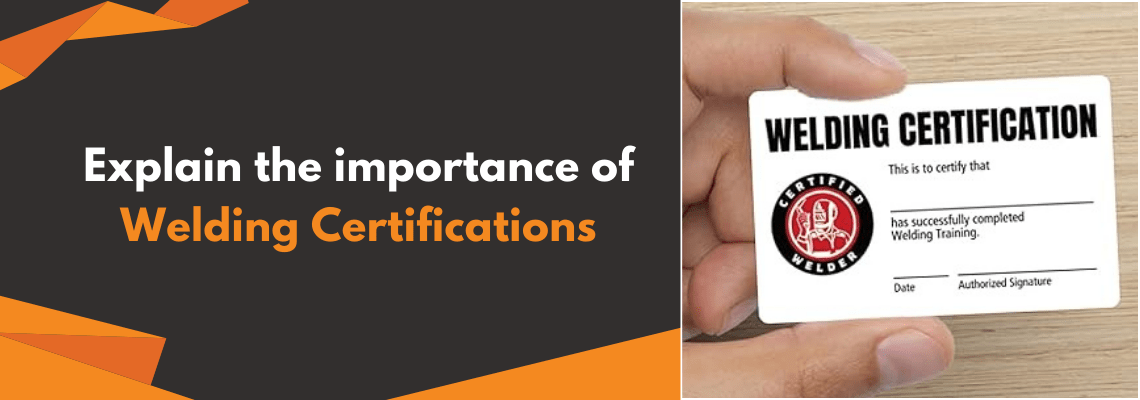Welding is a critical process in many industries, from construction and manufacturing to automotive and aerospace. The quality of welding work directly impacts the safety, durability, and longevity of structures and products. This makes welding certifications essential for professionals in the field. Welding certifications are not just a formality; they are a testament to a welder’s skill, knowledge, and ability to perform specific tasks according to industry standards. In this article, we’ll explore why welding certifications are so important, how they benefit both welders and employers and what you need to know to get certified.
What is a Welding Certification?
A welding certification is a qualification that demonstrates a welder’s ability to perform a specific type of weld, typically under certain conditions and within set parameters. These certifications are usually issued by recognized organizations, such as the American Welding Society (AWS) or the American Society of Mechanical Engineers (ASME). They assess a welder’s competency in various welding processes, including MIG, TIG, and stick welding, across different materials like steel, aluminum, and stainless steel.
The Role of Welding Certifications in Industry Standards
Welding certifications are crucial in maintaining industry standards. They ensure that welders have the necessary skills to produce work that meets stringent safety and quality requirements. Without certifications, there would be no standardized way to measure a welder’s ability to perform specific tasks, leading to potential risks in safety and product integrity. Certified welders are trained to follow best practices and adhere to the precise specifications required in different welding scenarios, which is vital for welding industries where precision and reliability are non-negotiable.
Enhancing Safety with Certified Welders
Safety is a paramount concern in any industry that involves welding. Improper welding techniques can lead to structural failures, which can have catastrophic consequences, especially in sectors like construction and aerospace. Certified welders are trained to recognize and avoid common welding hazards, such as electrical shock, toxic fumes, and fire risks. Their certification assures employers that they are capable of performing their duties safely and effectively, minimizing the risk of accidents on the job.
Improving Job Opportunities and Career Advancement
For welders, obtaining a certification is a significant step towards career advancement. Many employers require welders to be certified before they can even be considered for a job. Welding certifications open doors to more job opportunities, higher pay, and positions with greater responsibility. Certified welders are often seen as more valuable employees because their skills are verified by a third-party organization. This gives them a competitive edge in the job market, making them more likely to be hired and promoted.
Meeting Regulatory and Legal Requirements
In many industries, welding certifications are not just preferred—they’re mandatory. Regulatory bodies often require companies to employ certified welders to ensure that all work meets local, national, and international standards. For example, in the construction industry, certain types of welding work must be performed by a certified welder to comply with building codes and safety regulations. Failing to meet these requirements can result in legal repercussions, including fines and penalties, as well as potential damage to a company’s reputation.
Ensuring Consistent Quality in Welding Work

Consistency is key in welding, especially in industries where products and structures must meet exacting standards. Certified welders are trained to produce high-quality welds consistently, reducing the likelihood of defects and ensuring that every project meets the required specifications. This consistency is particularly important in industries like automotive and aerospace, where even the smallest imperfection can have serious consequences.
Boosting Employer Confidence and Client Trust
Employers and clients alike have more confidence in welders who hold certifications. For employers, hiring certified welders means less time and money spent on training, fewer errors, and a lower risk of rework or project delays. Clients are more likely to trust a company that employs certified welders, as it reflects a commitment to quality and safety. This trust can lead to more business opportunities and long-term client relationships, as well as a stronger reputation in the industry.
The Process of Obtaining a Welding Certification
Getting certified as a welder typically involves passing a written exam and a hands-on welding test. The written exam tests a welder’s knowledge of welding theory, safety practices, and industry standards. The hands-on test requires the welder to perform a specific type of weld under controlled conditions, which is then inspected and tested for quality. Welding certification exams are often rigorous and require extensive preparation, but the benefits of becoming certified far outweigh the effort involved.
The Costs and Time Investment in Welding Certifications
While obtaining a welding certification requires an investment of time and money, the long-term benefits make it a worthwhile endeavor. The cost of certification can vary depending on the type of certification and the certifying organization, but it generally includes fees for the exam, materials, and any preparatory courses. The time investment also varies, with some certifications taking a few weeks to obtain, while others may require several months of training and practice. However, the return on this investment is significant, as certified welders often command higher salaries and have better job security.
The Future of Welding Certifications
As technology advances and industries continue to evolve, the demand for certified welders is expected to grow. New materials, techniques, and applications are being developed, requiring welders to continuously update their skills and certifications. Staying current with industry trends and obtaining additional certifications can help welders remain competitive in the job market and ensure their skills are in line with the latest industry standards.
Welding certifications play a critical role in ensuring the safety, quality, and consistency of welding work across various industries. They provide a standardized way to measure a welder’s skills, enhancing job opportunities, meeting regulatory requirements, and boosting employer confidence. For welders, obtaining certification is a valuable investment in their careers, offering long-term benefits that far outweigh the costs. As the industry continues to grow and evolve, welding certifications will remain an essential component of professional development and success.






